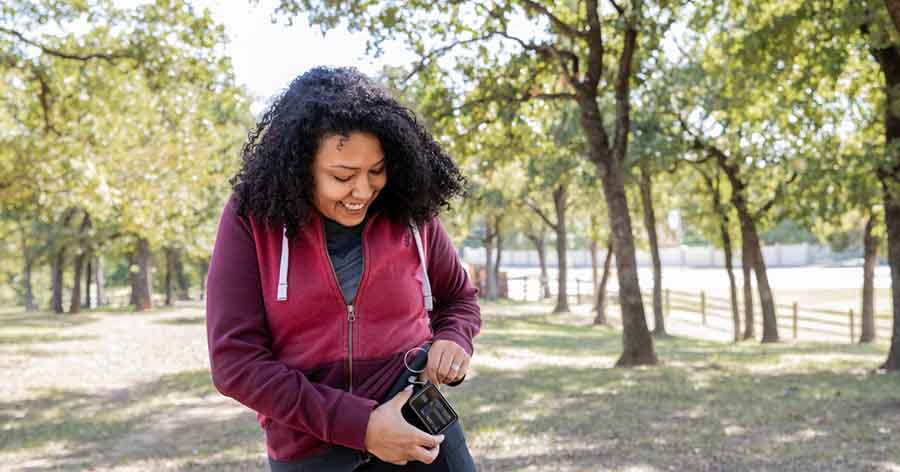I was diagnosed with type 2 diabetes in the late 1970’s, at a time when total education on diabetes was short and sweet. The advice was that as I had only a wee touch of sugar, I should diet, cut out sweet things and watch my weight. Friends and relatives were not very helpful either as they all believed that type 2 diabetes was not something to worry about. ‘It is the diabetes where you take insulin that you have the problems as you can go into a coma.’ I was given all sorts of conflicting and mythical advice on what I should not eat or drink.
Looking back, I have realised how different the environment was compared with today with regards to type 2 diabetes education. Information about this disease in the 1970’s was negligible in the public domain. There was no internet to scan for information on diabetes, no leaflets on diabetes, no TV debates on healthy eating – it was as if type2 diabetes did not exist. The medical profession were the only source of information and I believe that type 2 diabetes at that time was of minimal priority to them.
The effect of this ignorance about type 2 diabetes on my lifestyle was at first to carry on as usual. Fortunately, I was in good health otherwise, and as diabetes is a transparent disease I did not feel or look ill. There were no diabetes nurses, diabetes clinics or educational workshops. Six month check-ups were unheard off. After 15 years of a lack of information and ignorance I was at the stage where I was in complete denial that I had diabetes.
Changing times
So what changed my attitude to this mild disease? In 1992, I was diagnosed with a serious eye condition needing laser treatments and 2 years later I developed feet problems. At this stage in my type 2 diabetes journey I was being educated the hard way but it was the only alternative I had. No one gave me reasons why these conditions happened. One could say why did you not ask, but I did not know the questions to ask.
In the late 1990s, the overall environment had changed with regards to type 2 diabetes, due to obesity, lack of exercise and modern lifestyle. This had produced a dramatic increase in the number of newly diagnosed patients with diabetes, and diabetes had become a serious problem nationwide. It was recognised that diabetes was a major cause of cardiovascular conditions, and that this increase would swamp the surgical units. At last, I thought, diabetes has come to the top of the NHS priority list even though it had piggy-backed through the back door.
The expert patient programme
It was just at this time, when I had started taking insulin, that my knowledge of diabetes took a massive leap forward. I was sent to Queen Alexander Hospital at Cosham where I was to receive advice and guidance on insulin usage. My consultant nurse, Sue Craddock, was piloting a formal education package for people newly diagnosed with type 2 diabetes in the form of a 1 day workshop. She asked if I could participate as an expert patient. She explained the major concept of the workshop was to encourage people to manage diabetes themselves.
I readily agreed for a number of mainly selfish reasons: the main one being that I would at last, after 25 years, understand diabetes. I thought this was a wonderful idea as I felt that due to my ignorance of this condition I would be unable to administer my insulin programme with confidence. It also gave me the opportunity to tell new patients of the problems, difficulties and regrets that I had faced in 25 years without this knowledge so they would not fall into the same traps.
The workshop’s morning session completely changed my perception of diabetes. For the first time in 25 years, I started to understand how sugar was corroding and damaging my blood vessels. The results of this damage explained why I had eye and feet conditions. What was more worrying was the impact of high blood pressure and cholesterol giving a life threatening risks of strokes and heart problems. I now knew what my blood pressure, cholesterol, HDL, HbA1c, and of course my blood glucose readings, should be and what they meant. I was also given a basic knowledge of the effects of my prescribed medicine. I was now ready to take the first steps in self-management of my diabetes. I could also ask the right questions to medical professionals and understand their answers.
The afternoon was all about how I could manage my diabetes through healthy eating and exercise. All the myths I had been told over 20 years were gradually demolished.
The word diet did not enter into this course although weight and shape were described as important factors to reducing risk of complications. The approach was for me to get a fundamental knowledge of the effects of certain foods groups so I could manage my diabetes. I learnt how certain foods increase or slow down my sugar levels, reduce my cholesterol, increase my HDL, and how omega3 oil protects my heart. There were no diet sheets to follow, but guides to healthy eating and portion control which eventually would lead to weight reduction and diabetes control. The exercise factor was the last piece of the jigsaw, the day ended by putting together an action plan to kick start managing my new lifestyle and minimise my risk of more complications.
What a brilliant day it had been but unfortunately it raised another question. Will I be able to change my lifestyle after years of living with diabetes without this type of help?
This is why formal education is the only way ahead because a total overall education package can help the patient with diabetes from diagnoses through to the insulin stages and so create and maintain a change in their lifestyle. At Portsmouth, follow-up training is now being piloted in two practices for the people who attended the first course.
Impact of the programme
When I look back on that day I think about why the course had such an impact on me. Although content was high on my list, it was also the way the course was constructed. It was not the usual inadequate piecemeal, 10 minute ‘tell and sell’ approach that I have had over the years by different medical professionals. Each stage was well thought out to lead the group, listen to their questions and concerns and seek satisfactory answers. On reflection, the fact that the workshop session was for a group of ten newly diagnosed patients with diabetes was of key importance. Husbands and wives were also encouraged to attend to emphasise the difficulties patients would have in changing their lifestyle and the effect it would have on their family life. The facilitators skilfully and very flexibly guided the group’s conversation into an interactive session, but did not try to dominate it. With the group sharing information, views and experience about diabetes, this added greater value which does not come from one to one type education. This also gives the opportunity to maintain the same standard message to every new person with diabetes. Patient perception is widened through this cross-cultural exchange, and in my opinion this is the workshop’s greatest strength.
Practicalities
The major difficulty is to find and train facilitators who can moderate and work flexibly within a framework. Facilitators must be able to unify threads in a discussion, build, weave and represent ideas constantly during a session. I have been told that in the next 5 years there will be an enormous increase in people who are newly diagnosed with diabetes due to better screening. This will lead to more and more initial workshops and follow-up training requirements, and of course a need for more special teachers trained to meet this challenge. I know this problem is being addressed as it is so crucial to the overall success of the total formal education programme.
It is important that plans and pilot courses that are now in place are funded properly so that the education service of the NHS can meet this demand in the near future. My last concern is for the future, as a retired senior executive my experience of education programmes when things got tough economically was not a good one. Education was always expendable as the first line of expense. The only way to counteract this is for formal education to have strong financial business cases rubber stamped and audited by the finance department. Education programmes have to be monitored for effectiveness, efficiency and efficacy so that present and future politics cannot interfere and cut education as an easy option to reducing costs in the NHS.
I am not an educationalist and my perception of formal education is based and limited to the 3.5 years as a volunteer at the Portsmouth diabetes workshop. The formal educational workshop was a hiatus point in my lifestyle change. I know that it has also been so for many patients who have attended these workshops.
To succeed in the future, educationalists must keep looking over the wall to see what the rest of the world is doing. This will enable them to introduce affordable new ideas to enhance present programmes. I recognise the major leap forward that the present workshop and follow-up concepts have made. It is essential that the workshop reflects the best affordable diabetes education for the community in the future.
Formal education is only part of the jigsaw. Today I applaud the pressure placed on food manufacturers to produce healthy foods, better labelling and on educating children and parents about healthy eating and exercise. It is great to see pharmacies getting involved in screening for diabetes. Where the message is not getting through I suggest a mass hypnosis session of the country!
Regrets
I have a number of regrets: firstly, that the formal education at present only deals with people newly diagnosed with diabetes. What about patients like me who have not had the advantage of this type of workshop? Where are the courses for them? Do I have to wear a bell around my neck? I understand why it is easier to manage newly diagnosed patients as they are not set in their ways. One of your new challenges is to find the answer to meet their education needs.
Regret two is that I did not have this workshop 28 years ago. I believe I would not have the conditions I have today and a better quality of life. I leave you with this thought.
People with diabetes may feel they have been dealt a bad hand. It is not the hand that is important but how you play it. You can play it badly like I did, through ignorance and stupidity, or play it well, being educated to a standard where you can self manage this silent disease early and successfully.





Developments that will impact your practice.
5 Mar 2025